unit10[下学期]
图片预览
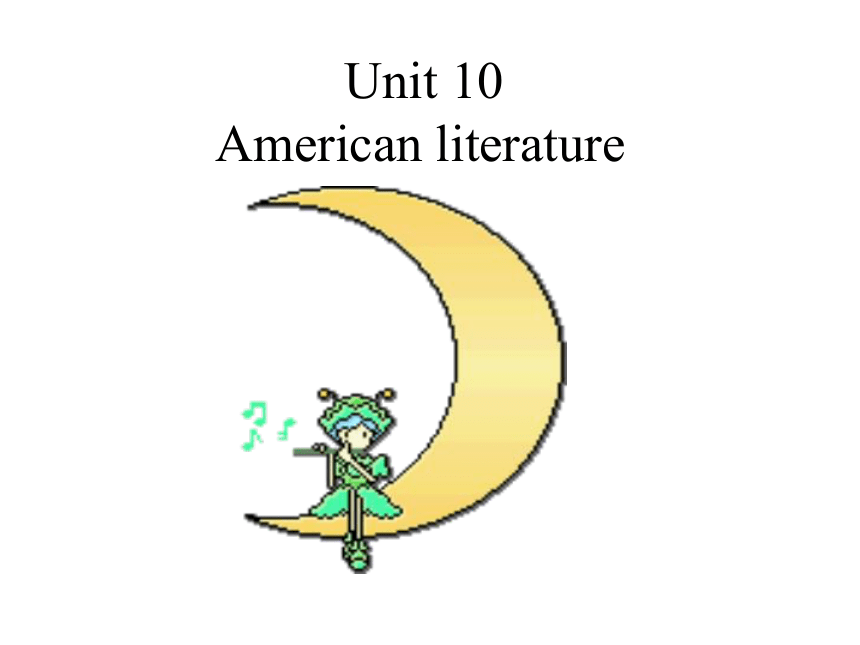
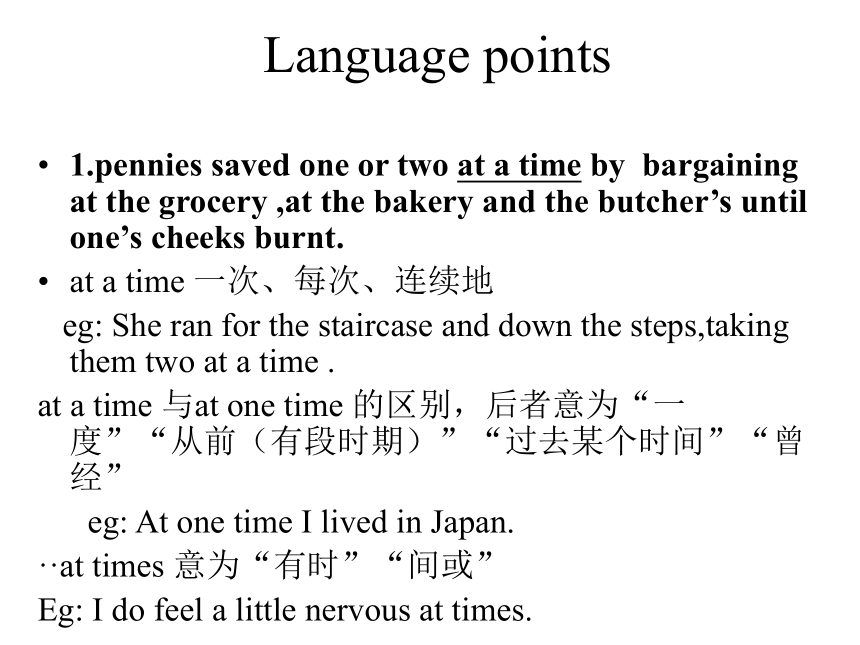
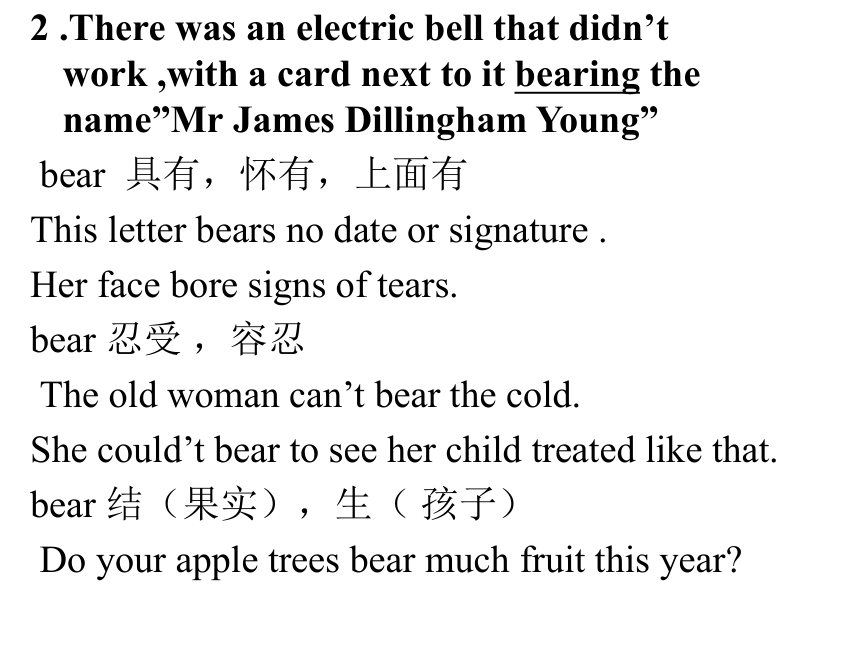
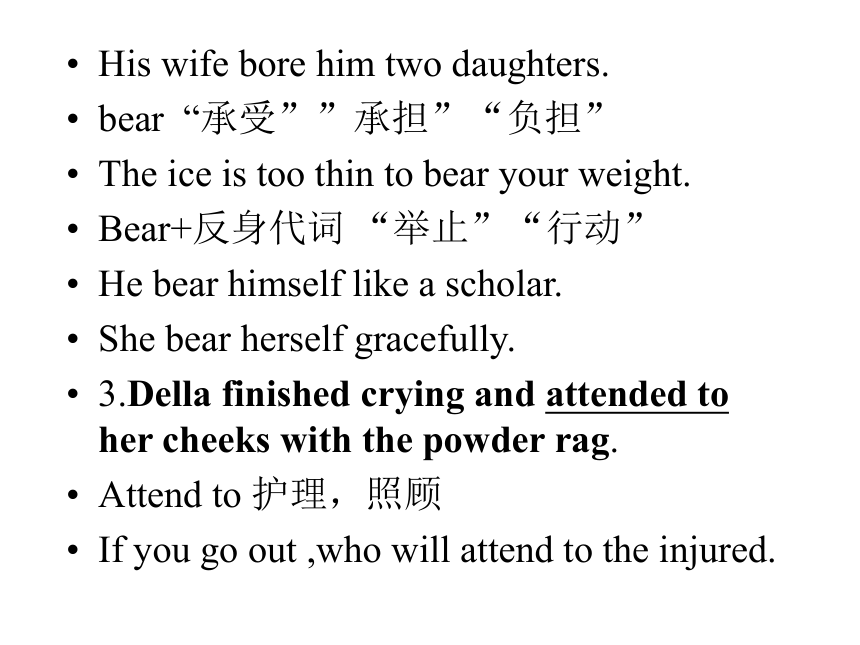
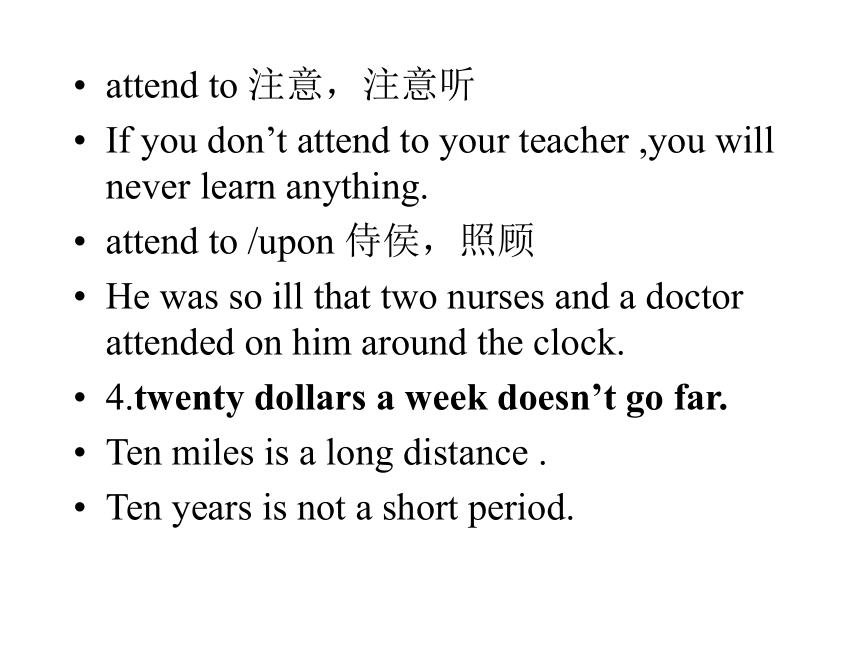
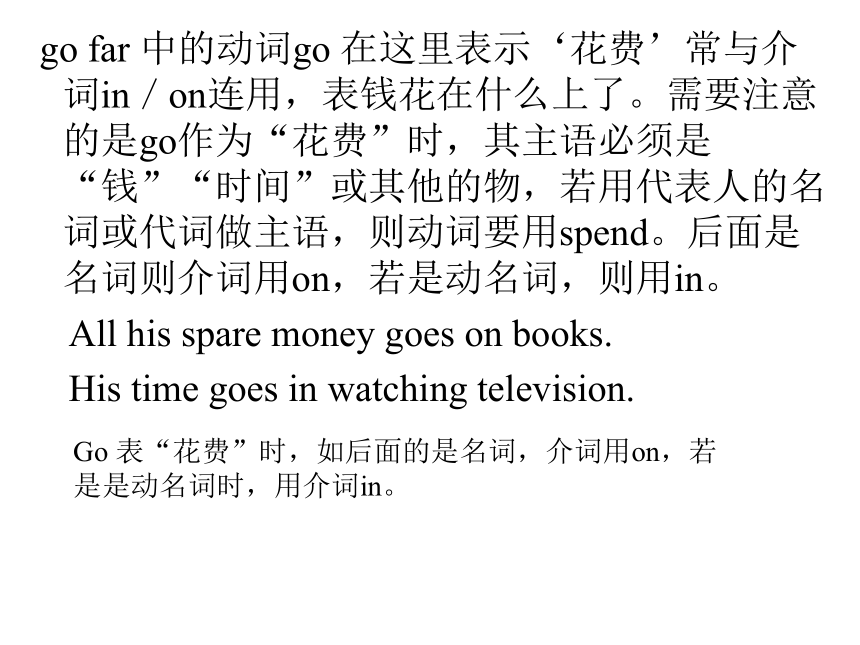
文档简介
课件13张PPT。Unit 10
American literature Language points1.pennies saved one or two at a time by bargaining at the grocery ,at the bakery and the butcher’s until one’s cheeks burnt.
at a time 一次、每次、连续地
eg: She ran for the staircase and down the steps,taking them two at a time .
at a time 与at one time 的区别,后者意为“一度”“从前(有段时期)”“过去某个时间”“曾经”
eg: At one time I lived in Japan.
··at times 意为“有时”“间或”
Eg: I do feel a little nervous at times.2 .There was an electric bell that didn’t work ,with a card next to it bearing the name”Mr James Dillingham Young”
bear 具有,怀有,上面有
This letter bears no date or signature .
Her face bore signs of tears.
bear 忍受 ,容忍
The old woman can’t bear the cold.
She could’t bear to see her child treated like that.
bear 结(果实),生( 孩子)
Do your apple trees bear much fruit this year?
His wife bore him two daughters.
bear “承受””承担”“负担”
The ice is too thin to bear your weight.
Bear+反身代词 “举止”“行动”
He bear himself like a scholar.
She bear herself gracefully.
3.Della finished crying and attended to her cheeks with the powder rag.
Attend to 护理,照顾
If you go out ,who will attend to the injured.
attend to 注意,注意听
If you don’t attend to your teacher ,you will never learn anything.
attend to /upon 侍侯,照顾
He was so ill that two nurses and a doctor attended on him around the clock.
4.twenty dollars a week doesn’t go far.
Ten miles is a long distance .
Ten years is not a short period.
go far 中的动词go 在这里表示‘花费’常与介词in/on连用,表钱花在什么上了。需要注意的是go作为“花费”时,其主语必须是“钱”“时间”或其他的物,若用代表人的名词或代词做主语,则动词要用spend。后面是名词则介词用on,若是动名词,则用in。
All his spare money goes on books.
His time goes in watching television.
Go 表“花费”时,如后面的是名词,介词用on,若是是动名词时,用介词in。5. She pulled down her hair and let it fall to its full length.
Pull down 拉下
拆除,摧毁
使精神不振,使体质减弱
Pull down the shade of the window.
It is easier to pull down than to build.
The fever has pulled me down.
6. And then she quickly did it up again.
She did her hair up in a bun to keep it out of her eyes.
梳理头发;扎紧We shall have to do up the house next spring.
Do up these papers and send them to Head Office.
She was done up with teaching all day.
7. She looked at several barbershops, and finally stopped at a sign that read: “Madame Sofronie.---”
Read “读做 ” “内容是”
The statement reads in full as follows: 声明全文如下:修理,打扮包扎,捆使累垮read有时表示“读起来”,“看起来”
The sentence reads oddly.
This doesn’t read like a child’s compositions.
8. Down flowed the brown cascade.
这是一个倒装句,以down, up, on, off, in, out, away开头的句子,主谓要倒装,直接把谓语动词放置主语之前,不需借用助动词。
Up went the arrow into the air.
Away went the runners.
She rang the bell. In came a girl she had not seen before.由there, here, then引起的句子,也用完全倒装形式,不用助动词。
There goes the bell.
Here is a cup of tea for you.
Now comes your turn.
Then came a new difficulty.
有些句子没有宾语而主语又比较长,可将状语放到句首,而把主语放到句末,这也是一种完全倒装形式,不须借用助动词。
At the top of the hill stands a tiny temple.
From the distance, came occasional shots.
9. Be good to me, for it went out of love for you.
out of 意为“出于-----;由于-----”
He asked the questions out of curiosity.
She did it out of pity.
They were keeping her only out of kindness.
10. Something fine and rare --- something worthy of the honour of being owned by Jim.
Worthy= deserving 在句中做表语或定语。做表语时, + of + n./ being done
+ to do Eg. The place is worthy of a visit.
This novel is not worthy of being translated.
This suggestion is worthy to be considered.
Worthy 做定语时,意思是“ 可尊敬的,有价值的”。(= deserving respect)但在实际应用中往往带有幽默,讽刺“还算不错”的意味。
Eg. This worthy gentleman couldn’t even tell wheat from barley。
那位可尊敬的先生连大麦和小麦分不清。
Worthy 与worth的区别:
1)worth用作形容词时和worthy差不多,表“值”。
2)两者作表语时,都不可单用。
3)worth做形容词时只能作表语。+doing的主动形式来表示被动的意义。或+ n.
This book is well worth reading .
This dictionary is worth ten yuan。
Worth while 的意思是“值得”。可以单独用作表语。还常用在“ it is worth while”句系型中,+doing/ to do
I don’t think it is worth while.
It is worth while discussing / to discuss the question.
at a time 一次、每次、连续地
eg: She ran for the staircase and down the steps,taking them two at a time .
at a time 与at one time 的区别,后者意为“一度”“从前(有段时期)”“过去某个时间”“曾经”
eg: At one time I lived in Japan.
··at times 意为“有时”“间或”
Eg: I do feel a little nervous at times.2 .There was an electric bell that didn’t work ,with a card next to it bearing the name”Mr James Dillingham Young”
bear 具有,怀有,上面有
This letter bears no date or signature .
Her face bore signs of tears.
bear 忍受 ,容忍
The old woman can’t bear the cold.
She could’t bear to see her child treated like that.
bear 结(果实),生( 孩子)
Do your apple trees bear much fruit this year?
His wife bore him two daughters.
bear “承受””承担”“负担”
The ice is too thin to bear your weight.
Bear+反身代词 “举止”“行动”
He bear himself like a scholar.
She bear herself gracefully.
3.Della finished crying and attended to her cheeks with the powder rag.
Attend to 护理,照顾
If you go out ,who will attend to the injured.
attend to 注意,注意听
If you don’t attend to your teacher ,you will never learn anything.
attend to /upon 侍侯,照顾
He was so ill that two nurses and a doctor attended on him around the clock.
4.twenty dollars a week doesn’t go far.
Ten miles is a long distance .
Ten years is not a short period.
go far 中的动词go 在这里表示‘花费’常与介词in/on连用,表钱花在什么上了。需要注意的是go作为“花费”时,其主语必须是“钱”“时间”或其他的物,若用代表人的名词或代词做主语,则动词要用spend。后面是名词则介词用on,若是动名词,则用in。
All his spare money goes on books.
His time goes in watching television.
Go 表“花费”时,如后面的是名词,介词用on,若是是动名词时,用介词in。5. She pulled down her hair and let it fall to its full length.
Pull down 拉下
拆除,摧毁
使精神不振,使体质减弱
Pull down the shade of the window.
It is easier to pull down than to build.
The fever has pulled me down.
6. And then she quickly did it up again.
She did her hair up in a bun to keep it out of her eyes.
梳理头发;扎紧We shall have to do up the house next spring.
Do up these papers and send them to Head Office.
She was done up with teaching all day.
7. She looked at several barbershops, and finally stopped at a sign that read: “Madame Sofronie.---”
Read “读做 ” “内容是”
The statement reads in full as follows: 声明全文如下:修理,打扮包扎,捆使累垮read有时表示“读起来”,“看起来”
The sentence reads oddly.
This doesn’t read like a child’s compositions.
8. Down flowed the brown cascade.
这是一个倒装句,以down, up, on, off, in, out, away开头的句子,主谓要倒装,直接把谓语动词放置主语之前,不需借用助动词。
Up went the arrow into the air.
Away went the runners.
She rang the bell. In came a girl she had not seen before.由there, here, then引起的句子,也用完全倒装形式,不用助动词。
There goes the bell.
Here is a cup of tea for you.
Now comes your turn.
Then came a new difficulty.
有些句子没有宾语而主语又比较长,可将状语放到句首,而把主语放到句末,这也是一种完全倒装形式,不须借用助动词。
At the top of the hill stands a tiny temple.
From the distance, came occasional shots.
9. Be good to me, for it went out of love for you.
out of 意为“出于-----;由于-----”
He asked the questions out of curiosity.
She did it out of pity.
They were keeping her only out of kindness.
10. Something fine and rare --- something worthy of the honour of being owned by Jim.
Worthy= deserving 在句中做表语或定语。做表语时, + of + n./ being done
+ to do Eg. The place is worthy of a visit.
This novel is not worthy of being translated.
This suggestion is worthy to be considered.
Worthy 做定语时,意思是“ 可尊敬的,有价值的”。(= deserving respect)但在实际应用中往往带有幽默,讽刺“还算不错”的意味。
Eg. This worthy gentleman couldn’t even tell wheat from barley。
那位可尊敬的先生连大麦和小麦分不清。
Worthy 与worth的区别:
1)worth用作形容词时和worthy差不多,表“值”。
2)两者作表语时,都不可单用。
3)worth做形容词时只能作表语。+doing的主动形式来表示被动的意义。或+ n.
This book is well worth reading .
This dictionary is worth ten yuan。
Worth while 的意思是“值得”。可以单独用作表语。还常用在“ it is worth while”句系型中,+doing/ to do
I don’t think it is worth while.
It is worth while discussing / to discuss the question.
